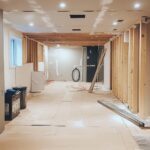The Role of Permits in Home Renovations

Embarking on a home renovation journey transforms your living space, breathing new life into your home. Whether it’s updating your kitchen, modernizing your bathroom, or finishing your basement, renovations can significantly enhance your home’s functionality and aesthetic appeal. However, an essential yet often overlooked aspect of this transformative process is understanding and obtaining the necessary permits. In Ontario, Canada, navigating local regulations and permits is crucial for homeowners aiming to renovate their spaces. These permits are not just bureaucratic red tape; they serve as your safeguard, ensuring that your renovation project is safe, compliant, and ultimately successful. By familiarizing yourself with the role of permits in home renovations, you lay the groundwork for a smooth, legally sound project that aligns with local building standards and regulations.
Understanding Building Permits in Ontario
What is a Building Permit?
A building permit is an official approval issued by local municipalities that allows you to proceed with construction, demolition, or renovation on your property. This document is crucial as it confirms that your project plans comply with local building codes, zoning laws, and other regulations. The primary purpose of a building permit is to ensure that all renovations and constructions are safe, accessible, and in alignment with the community’s planning and structural standards.
Legal Requirements for Obtaining a Permit in Ontario
In Ontario, the legal requirement for obtaining a building permit is outlined in the Ontario Building Code (OBC), which sets forth the standards for the design and construction of buildings across the province. The OBC ensures that all construction meets uniform safety and structural integrity standards, protecting the health and safety of occupants and the general public.
To obtain a building permit, homeowners must submit detailed plans of their proposed renovation to their local municipal building department for review. These plans must include detailed drawings, site plans, and descriptions of the work to be performed. The review process assesses whether the proposed renovations comply with the OBC and other applicable laws and regulations.
It’s important to note that not all renovation projects require a permit. However, major renovations that alter the structure or use of a building, such as adding a room, modifying load-bearing walls, or changing plumbing and electrical systems, typically require approval. Understanding when a permit is needed and how to navigate the application process is essential for any homeowner considering renovations in Ontario. Failure to obtain the necessary permits can lead to significant penalties, legal issues, and costly corrections down the line.
Navigating the world of building permits in Ontario might seem daunting at first, but it’s a crucial step in ensuring that your renovation project is built to last, safe for its inhabitants, and compliant with all local regulations. By understanding and respecting the permit process, homeowners can embark on their renovation projects with confidence, knowing they’re contributing to a safer, more regulated construction environment.
When Do You Need a Building Permit in Ontario?
In Ontario, the need for a building permit hinges on the nature and scope of your renovation project. Generally, permits are required for any construction, demolition, or alteration that changes a building’s structure or systems. Here’s a closer look at renovation projects within your home—specifically in kitchens, bathrooms, and basements—that typically necessitate a building permit:
- Structural Changes: Any modification to load-bearing walls, the addition of rooms, or changes to the building’s footprint.
- Additions: Expanding your home’s existing space, such as adding a sunroom or a second-story addition.
- Major Alterations: Extensive renovations that alter the use of space or involve significant updates to electrical, plumbing, or HVAC systems.
- Kitchens: Moving or removing walls, changing plumbing locations, or installing new windows or doors.
- Bathrooms: Adding a new bathroom, relocating existing fixtures, or modifying the plumbing system.
- Basements: Finishing an unfinished basement, altering the foundation, adding egress windows, or installing a basement kitchenette or bathroom.
Obtaining a building permit before proceeding with these types of projects ensures compliance with the Ontario Building Code, zoning laws, and other relevant regulations. It’s advisable to consult with your local municipal building department to determine if your specific renovation project requires a permit.
The Benefits of Obtaining a Permit
Safety
One of the primary benefits of obtaining a building permit is ensuring that all renovations meet the stringent safety standards set forth in the Ontario Building Code. This encompasses structural integrity, fire protection, electrical and plumbing safety, and overall building health. Permits necessitate inspections by qualified officials, which help identify and rectify potential safety hazards, ensuring the well-being of your home’s occupants.
Legality
Navigating the renovation process legally, with all the required permits, protects you from future legal and financial liabilities. Renovating without a permit can lead to fines, the halting of your project, or the requirement to undo completed work. Furthermore, if you ever decide to sell your property, having the proper permits for all renovations can expedite the sale process and avoid legal complications.
Value
Legal renovations with the necessary permits can significantly increase your property’s value. Potential buyers are reassured by the fact that all modifications comply with the latest building standards, making your home more attractive in the competitive real estate market. Moreover, properly permitted renovations can prevent the depreciation that might result from future legal and safety issues associated with unpermitted work.
In summary, while the process of obtaining building permits in Ontario might seem cumbersome, the benefits far outweigh the initial effort and cost. Ensuring safety, legality, and the preservation or enhancement of your home’s value are compelling reasons to adhere to the permit process, setting the stage for a successful and compliant renovation project.
How to Apply for a Building Permit in Ontario
Navigating the permit application process in Ontario is a critical step towards a compliant and successful home renovation. Here’s how you can approach it:
Identifying the Correct Municipal Office to Apply: Start by determining the appropriate local municipal office for building permits, typically your town or city’s Building Department or Planning Department.
Gathering the Necessary Documentation: You’ll need to prepare comprehensive plans of your proposed renovation, including detailed drawings like floor plans, elevations, and sections. A current survey of your property showing existing structures and the proposed changes is also crucial. Depending on your project, additional documentation such as engineering studies or energy efficiency reports may be required.
Submitting Your Application: With your documentation ready, submit your application along with any necessary fees to the municipal office. Keeping copies of everything you submit for your own records is a good practice.
The Review Process: After submission, your application will undergo a review process where municipal officials ensure it complies with the Ontario Building Code, zoning laws, and other regulations. This process might involve reviews by multiple departments, which can take several weeks.
What to Expect: If your plans meet all requirements, you’ll be issued a building permit. If there are any issues or further information is needed, you’ll be notified to make adjustments or provide additional documentation.
Tips for a Smooth Application Process
Opt for a pre-consultation service if available, to identify potential issues early on. Ensure all your documentation is clear, detailed, and complete to avoid delays. Following up with the municipal office if you don’t hear back within the expected timeframe is also advisable.
The Role of Contractors in the Permit Process
Contractors can significantly aid in the permit application process. Their experience with similar projects means they know what permits are needed and the documentation required. They can help prepare and submit the necessary plans and paperwork, ensuring your submission meets the local requirements.
Hiring contractors who are well-versed in Ontario’s building codes and regulations is essential. Their expertise ensures your renovation adheres to the latest standards, ensuring safety and compliance. This not only helps in smooth approval of permits but also ensures the renovation work is done right, avoiding potential reworks or legal issues.
Benefits of Working with Knowledgeable Contractors
Experienced contractors can streamline the permit process, making it more efficient. Their knowledge ensures your project complies with local regulations, safeguarding the building’s safety and helping to preserve, if not increase, your property’s value.
The Consequences of Skipping Permits
Choosing to bypass the permit process for home renovations might seem like a shortcut to save time and money. However, this decision can lead to significant risks and penalties, affecting everything from the safety of the renovation to the legality and financial value of your home.
Risks and Penalties:
- Safety Hazards: Unpermitted work may not meet safety standards, posing risks to occupants.
- Legal Issues: Municipalities can issue stop work orders, fines, and require the removal or correction of the work at the homeowner’s expense.
- Insurance Complications: Insurance companies may refuse to cover damages related to unpermitted work.
- Selling Challenges: Selling a home with unpermitted renovations can be difficult; disclosures are required, and buyers may be hesitant.
Navigating Inspections and Final Approval
Once your renovation work is underway with the necessary permits, the project will be subject to inspections by municipal building inspectors. These inspections ensure that the work complies with the Ontario Building Code, local bylaws, and the approved plans.
Inspection Process:
- Initial Inspection: May be required before work begins, especially for projects involving structural changes.
- Ongoing Inspections: Inspectors may visit several times during construction to examine different stages of work, such as framing, electrical, and plumbing.
- Final Inspection: Once the project is completed, a final inspection is conducted to ensure all work is finished in compliance with the permit.
Preparing for Inspections:
- Ensure easy access to the areas being inspected.
- Have copies of the permit, approved plans, and inspection schedule on hand.
- Address any issues noted by inspectors promptly to avoid delays.
Securing Final Approval
Final approval is granted once your project passes the final inspection. This approval is a formal acknowledgment that your renovation complies with applicable regulations and is safe for occupancy.
Resources and Support for Homeowners
For homeowners seeking more information on permits and the renovation process in Ontario, several resources are available:
- Ontario Building Code: For the comprehensive regulatory framework that governs construction, renovation, and change-of-use projects in Ontario, visit the e-Laws website where the Building Code Act, 1992 and its regulations are updated regularly. Ontario Building Code Act, 1992
- Municipal Websites: Many municipal websites offer detailed information specific to their area. For example, the City of Toronto provides extensive resources for building permits, which can be a useful reference point regardless of your specific location in Ontario. City of Toronto – Building Permits
- ServiceOntario: While ServiceOntario primarily offers services and information on various provincial matters, their website can direct you to relevant departments for building and renovation queries within Ontario. For general information, ServiceOntario can be a starting point, but specific building permit information should be sought directly from municipal sources or the Ministry of Municipal Affairs and Housing.
Hire a Contractor that is Experienced With Building Permits
For personalized guidance and a hassle-free renovation process, consider reaching out to Yorkland Homes. Their expertise in navigating the complexities of the permit process ensures that your renovation project is both compliant and efficiently managed. Yorkland Homes offers tailored advice and professional assistance, making them an invaluable partner for your renovation needs. Contact Yorkland Homes today to ensure your project is in expert hands.








